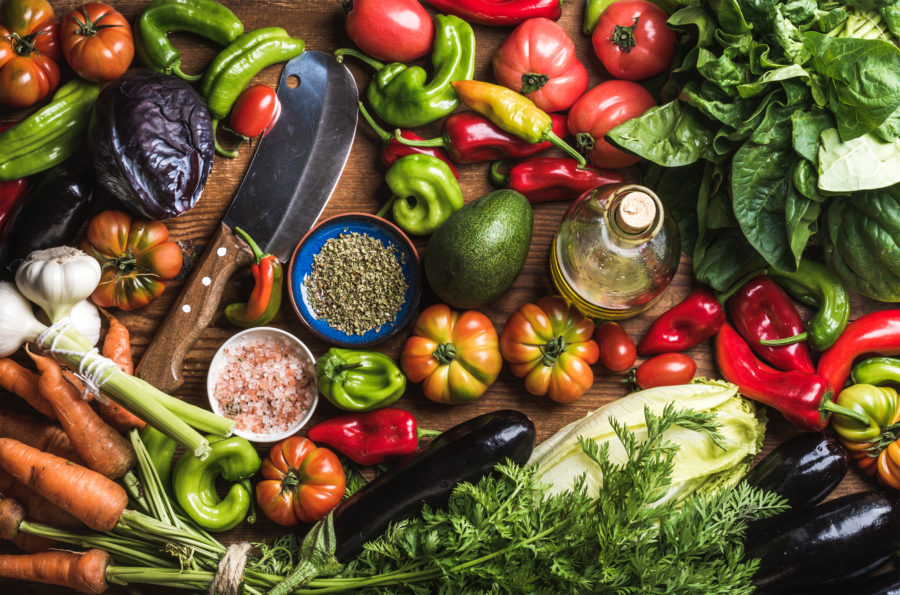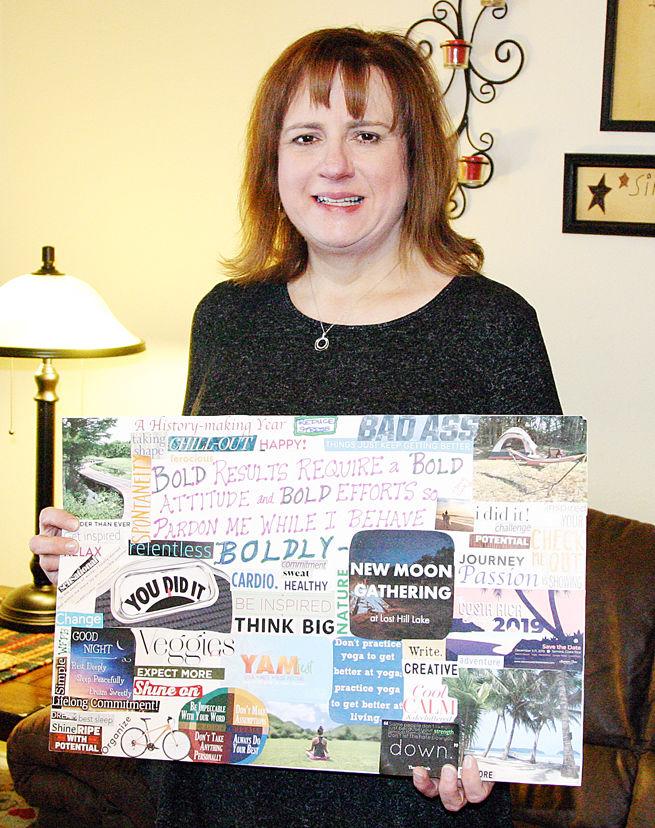
‘It’s Not a Diet. It’s a Lifestyle’ — Washington Woman Loses 100 Pounds, Reverses Diseases Eating Whole Food, Plant-Based Diet
Kara Bell, Washington, was in elementary school the first time she went on a diet. It didn’t help much as it wasn’t a full commitment to a whole food plant-based diet.
“I have been overweight or morbidly obese since I was 10,” said Bell, who is now 51.
Things began to change last May when, after getting violently ill from either a new medication, the food she was eating or both, Bell made the decision to stop dieting and take an entirely new approach to her life with a whole food, plant-based diet.
That means eating no meat, no dairy, no eggs and no added oils. She eats a lot of fruits, vegetables, whole grains and legumes (beans, peas, lentils).
“About 80 percent of my calories are complex carbohydrates,” said Bell, noting that includes brown rice and, on occasion, 100 percent whole wheat pasta.
Last week when Bell stepped on the scale she had hit a milestone — she had lost 100 pounds. It made her feel good, but she didn’t need to see the number to know she had already turned her life around. She felt it.
Within weeks of changing her eating habits, Bell, who had been diagnosed with Type 2 diabetes at age 39, no longer needed to take insulin and she was able to steadily decrease other medications as well. Last October, her doctor took her off the last of her medications for diabetes and high blood pressure and her most recent A1C test showed that she is out of the diabetic range.
“So I am no longer diabetic. I have reversed my diabetes,” said Bell, with a proud smile. “I am off all high blood pressure medicine too . . . now I only take medication for restless leg syndrome.”
Also Read: Plant-Based Foods, Whole Grains and Fruits May Cut Type-2 Diabetes Risk: 5 Foods You Must Have
Where She Started
In August 2017, Bell’s blood sugar had gotten so out of control, that she had to begin taking insulin to treat her Type 2 diabetes. That was a difficult reality to accept, but even with the insulin, her blood sugar numbers weren’t great.
“Because it was the food I was eating,” she said.She had tried the American Diabetes Association diet before, counting carbohydrates, and but that never really worked, because she was still always hungry.
“I had become addicted to processed foods,” said Bell. “I love to cook, but I was exhausted all of the time, so cooking became a laborious chore for me. I hate to admit it, but I liked fast food . . . Even when I cooked at home, I used a lot of fat in my food. It tasted really good, but it wasn’t healthy.
“And I ate a lot of processed food,” she said. “It could have been from a can or a box, and I would use it to make something better, but I still used processed foods. A lot of people cook that way. That’s the standard American diet.”
Bell said she tried every diet you’ve heard of and even some you haven’t to try to lose weight and get healthy. Very often she would lose weight, but the way she was eating wasn’t sustainable, so it was only ever a matter of time before she put the weight back on. And none of the diets ever helped her with the extreme fatigue she felt.
“Part of that was a result of never being able to get my blood sugar under control,” said Bell.
‘Why Didn’t I Know This?’
What was the final straw in getting Bell to make a change? There were several, she said.
Bell’s father, who was a Type 2 diabetic and in poor health, was diagnosed with prostate cancer, and a week later her mom died unexpected of what turned out to be heart disease.
“She had a major heart attack and just collapsed,” said Bell. “We had no idea she had heart disease. We had long suspected that she had Type 2 diabetes, but she wouldn’t go to the doctor.”
A little more than a year later, Bell’s father passed away. He had all kinds of complications from his diabetes, as well as congestive heart failure and the cancer.
“Watching him die was exhausting and heart-wrenching,” said Bell. “It was hard on me physically. I continued to decline physically. I ended up with a herniated disc, my blood sugar was even more out of control and I gained more weight because I was eating out of vending machines a lot.”
About six months after her father died, Bell happened across the documentary “Forks Over Knives,” about how people had eliminated and reversed health conditions by eating a whole food, plant-based diet.
“It’s what ultimately prompted me to change my life,” said Bell, noting she was most interested in the idea that diet could reverse disease.
“One doctor talked about a patient who had prostate cancer and eating this way helped stop the cancer from spreading, and I thought ‘Why didn’t I know this? Why isn’t this common knowledge?’ ” said Bell.
“I was encouraged and angry at the same time, so that summer I started watching videos by these doctors, reading their books, listening to podcasts. I did a bunch of research.”
Bell, who was working as a teacher at St. Clair High School at the time, tried to eat a strict whole food, plant-based diet, but once school was back in session for the fall, she went back to her old ways.
There’s a saying in the plant-based community, Bell points out — “Fail to plan, plan to fail.” But even though she wasn’t eating a plant-based diet, she kept reading, listening and watching webinars about it.
“I used any opportunity I could to learn,” she said, noting her daily commute to work from Washington to St. Clair was often spent listening to a podcast or webinar. “I immersed myself in the education of this way of eating, that lifestyle. I really just kept learning.”
Getting Sick Led Her to Healing Foods
In summer 2017, Bell decided to leave teaching and began working at the Scenic Regional Library in St. Clair as the branch manager. It gave her more free time, which she used to “dabble” in eating a whole food, plant-based diet. But she wasn’t getting a lot of results.
That November, her mother-in-law passed away after suffering a massive stroke. She’d had uncontrolled Type 2 diabetes and kidney damage and spent her last 10 days in the hospital ICU before she died. It was a wake-up call for Bell.
“I was at her bedside, watching her on tubes, life support, struggling, and I looked at Kurt, my husband, at one point and said, ‘I have to stop doing what I’m doing or I’m going to end up like my parents or your mom,’ ” she said. “But I still just dabbled. I knew (a plant-based diet) was the way to do it, but I just didn’t do it.
“I would eat a good breakfast, but fall off the wagon at lunch. I’d lose a little weight, but gain it back.”
Months earlier Bell had joined a Facebook group for whole food, plant-based eaters and met a woman, Elaine, in St. Louis who invited her to do batch cooking with her. Bell made plans to go a half-dozen or more times, but always canceled at the last minute.
“I had social anxiety at that point,” she said. “I wasn’t comfortable in my skin anymore. I am a very outgoing person, but I didn’t want to be around people. I didn’t feel well, I was tired, I was exhausted all the time, and I felt horrible about the way I looked. I felt clumsy and awkward. I didn’t look people in the eye. I had zero self-esteem.”
When the movie “Eating You Alive” about the whole food, plant-based lifestyle was being shown at the movie theater in Des Peres in April 2018, Bell bought a ticket. When she arrived, she took a seat in the back corner, hoping no one would notice her. But her Facebook friend Elaine was there, spotted her (even though they had never met face-to-face) and came over to talk.
Elaine introduced Bell to Caryn Dugan, the health coach and cooking instructor better known as “STL Veg Girl,” and encouraged her to register for one of Dugan’s “Forks Over Knives” cooking classes where she teaches people how to implement a whole food, plant-based lifestyle. Bell agreed to take a class, even though she had registered once before and canceled.
When she left the theater that day, Bell felt a lot of support — from Elaine, Caryn Dugan, even the woman who was sitting next to her in that back corner of the theater. She felt good about things and ended up registering for one of Dugan’s cooking classes at Dierbergs.
During that class is when Bell got violently ill either from some new medication she had started or possibly her diet, and that’s when Bell felt like the time had come for her to get serious. Elaine happened to be at the class and responded with love and support.
“She grabbed my face and said, ‘You need to take care of yourself. You’re important. You are worthy. I am here to help you. I will be with you. I will cook with you,’ ” Bell recalled, noting Dugan offered the same sentiment.
“She said. ‘We have to get you fixed up and get going on this.’ I knew she meant we had to get me eating this way because it would make me feel better, but something about her saying “we” made me feel better, like I wasn’t in it alone,” said Bell.
As she was driving home from the class that night, Bell made the decision to commit to the whole food, plant-based lifestyle.
“I knew exactly what to do because for 2 1/2 years I had been researching this,” she said. “I had the food in the house already. I had what I needed to get started . . . I really felt like I was going to die if I didn’t do this, and I got up the next morning, and I did it.”
It wasn’t all smooth sailing though. There were days and meals where Bell didn’t follow the plan. In the past whenever that happened, she would beat herself up about it and promise to start again at some point in the future — next week, next month, at the new year . . . This time, she promised to start fresh with her next meal.
“This time, if I made a mistake I said, ‘I’m going to make my next bite a good choice,’ and it wasn’t very long before I just stopped making those missteps,” said Bell. “All I really had to do was get past the cravings . . . and within two or three weeks that was done.”
Full of Energy for First Time
In the beginning, Bell said preparing her meals ahead of time so the food was ready as soon as she was hungry was key. If she didn’t do that, hunger would get the best of her and she would eat something she didn’t want to.
“I also got rid of all the processed foods in my house and anything that wasn’t going to be healthy,” she said. “I made my environment clean.
“I used to make food ahead so that when I was hungry, there were no excuses for not eating this way, but hunger isn’t an issue any more,” she said. “My blood sugar is not all over the place. It’s very stable, and that’s a beautiful feeling. If I’m hungry, it’s not an emergency . . . I can wait longer.”
A baker’s rack in Bell’s kitchen is filled with jars of rice and beans, cans of tomatoes and boxes of vegetable stock.
“Now when I shop, most of the foods I buy don’t have labels, or if they do, they have one or two ingredients,” she said. “I will occasionally eat Ezekiel Bread or Dave’s Killer Bread, some of their brands don’t have oil and are minimally processed. And I’ll eat corn tortillas that just have corn, a trace of lime and water.”
Although cutting meat, eggs and dairy out of a diet might sound like it doesn’t leave much else, Bell said that’s not true.
“This is not a starvation diet. I eat a lot of food, and there is variety too,” she said.
A typical breakfast might include two cups of cooked oatmeal with blueberries. For lunch, she might make a 12-ounce bag of broccoli and then add seasonings and Balsamic vinegar to eat with a bowl of chili over some brown rice. For a snack, if she felt hungry or like she needed to eat something, she will have a piece of fruit or maybe some hummus and carrot sticks.
Even though Bell has lost 100 pounds now, she said this way of eating is about more than just losing weight.
“I can eat anything I want now, but I don’t want to,” she remarked. “There are so many health benefits to eating this way and so many reasons not to eat the way I was before.
“This is really a health-promoting way of eating. This isn’t a diet. It’s just a way of eating. It’s a lifestyle. There’s no start or finish to this.
“I probably have another 50 pounds to lose, and when I reach that, I’m not going to go back to eating a different way because I feel so good now,” said Bell, noting that for the first time she feels energized every day and her fatigue is gone. “If I went back to eating that way, I would feel bad again.”
Losing weight and improving her health have given Bell an excitement for the future, but it’s also spurred her to want to share her knowledge.
“I love that I’ve lost weight and reversed diseases, but what I really want to do is share this information because I wish I had known about it sooner,” said Bell.
For the last several weeks, she has been participating in the “Transformation Tuesday” weight loss segment on KSDK Channel 5, and next month she will give a free presentation Thursday, March 7, at 6:30 p.m. at Neighborhood Reads bookstore in Downtown Washington. People are asked to register to ensure there are enough seats. To do that, they can stop by the store, call 636-390-9673 or check-in on the bookstore’s social media.
One of Bell’s goals is to set up a whole foods, plant-based lifestyle group in this area to provide support and answer questions for people who want to know more.
Other goals include running a 5K. Right now Bell’s main form of exercise is walking and hiking, but she’s working with a trainer at the Y to build up her strength, particularly her core strength, so she can add jogging to her routine.Her old coping skills to deal with stress used to be eating, especially fast food. Now, it’s walking.
“The more stressed I am, the more I walk,” she said, with a smile.
To learn more about Bell’s journey, you can read a blog she keeps at www.plant-poweredpassionateliving.com/.For more information on Caryn Dugan, go to http://stlveggirl.com/.
Click here to view original web page at ‘It’s Not a Diet. It’s a Lifestyle’ — Washington Woman Loses 100 Pounds, Reverses Diseases Eating Whole Food, Plant-Based Diet


 Kara Bell, Washington, holds up the vision board she created to represent her 2019 goals after reversing her Type 2 diabetes and high blood pressure by adopting a whole food, plant-based (WFPB) diet. Bell, who has been featured on the KSDK series “Transformation Tuesday,” will give a presentation about her weight loss and WFPB diet on Thursday, March 7, at 6:30 p.m. at Neighborhood Reads bookstore in Downtown Washington.
Kara Bell, Washington, holds up the vision board she created to represent her 2019 goals after reversing her Type 2 diabetes and high blood pressure by adopting a whole food, plant-based (WFPB) diet. Bell, who has been featured on the KSDK series “Transformation Tuesday,” will give a presentation about her weight loss and WFPB diet on Thursday, March 7, at 6:30 p.m. at Neighborhood Reads bookstore in Downtown Washington.